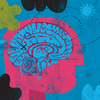
[ad_1]

Two mind circuits lend a hand decide whether or not there may be too little salt, or an excessive amount of.
Aleksandr Zubkov/Getty Photographs
conceal caption
toggle caption
Aleksandr Zubkov/Getty Photographs

Two mind circuits lend a hand decide whether or not there may be too little salt, or an excessive amount of.
Aleksandr Zubkov/Getty Photographs
If this yr’s turkey turns out over brined, blame your mind.
The query of when salty turns into too salty is made up our minds through a unique set of neurons within the entrance of the mind, researchers document within the magazine Mobile.
A separate set of neurons at the back of the mind adjusts your urge for food for salt, the researchers confirmed in a chain of experiments on mice.
“Sodium yearning and sodium tolerance are managed through utterly several types of neurons,” says Yuki Oka, an creator of the find out about and a professor of biology at Caltech.
The discovering can have well being implications as a result of salt ingestion is a “main factor” in many nations, together with america, says Nirupa Chaudhari, a professor of body structure and biology on the College of Miami’s Miller Faculty of Drugs.
An excessive amount of salt may cause hypertension and lift the chance for center illness and stroke, says Chaudhari, who used to be now not concerned within the find out about.
Yearning, to some degree
The find out about sought to give an explanation for the sophisticated dating that folks and animals have with salt, sometimes called sodium chloride.
We’re satisfied to drink sodas, sports activities beverages, or even faucet water that include just a little salt, Oka says. “However should you believe an overly top focus of sodium like ocean water, you truly hate it.”
This aversion to tremendous salty meals and drinks holds until your frame is truly low on salt, one thing that is lovely uncommon in other folks in this day and age. However experiments with mice discovered that once salt ranges plummet, the tolerance for salty water is going up.
“Animals get started liking ocean water,” Oka says.
The cause of this variation comes to no less than two other interactions between the frame and mind, Oka’s crew discovered.
When the focus of sodium within the bloodstream starts to fall underneath wholesome ranges, a collection of neurons at the back of the mind reply through dialing up an animal’s yearning for salt.
“For those who stimulate those neurons, then animals run to a sodium supply and get started consuming,” Oka says.
In the meantime, a special set of neurons within the entrance of the mind displays the saltiness of any meals or water the mice are eating. And in most cases, those neurons will set an higher prohibit on saltiness.
But if salt ranges get extraordinarily low, the frame sends a sign that overrides those salt-limiting neurons. That permits mice to tolerate the saltiness of sea water.
The scientists have been in a position to imitate this phenomenon within the lab through stimulating those neurons.
Connecting frame and mind
The discovering provides to scientists’ working out of interoception, which comes to sensations like starvation, ache, and thirst and tells the mind what is going on within the frame. It is a moderately unexplored type of sensory data, in contrast to the sensory data coming from the eyes, ears, nostril, tongue and pores and skin.
“The mind receives lots of sensory data from the guts, the lungs, the tummy, the gut,” says Stephen Liberles, a professor and Howard Hughes Scientific Institute investigator at Harvard Scientific Faculty. “And the way those paintings has remained extra mysterious.”
The brand new find out about discovered proof that the mind cells interested in salt tolerance reply to hormone-like elements known as prostaglandins. Those elements, which flow into within the bloodstream, are highest identified for his or her position in inflicting irritation, fever, and ache.
Now it is changing into increasingly more transparent additionally they play a job in changing salt tolerance.
“The query is: How is similar chemical, the similar prostaglandin molecule … reused in several contexts?” Liberles says.
Answering that query may make it imaginable to increase a prostaglandin drug to deter other folks from consuming an excessive amount of salt.
Salt overconsumption has grow to be a global downside as a result of people advanced in occasions when salt used to be scarce, says Chaudhari.
“Wars have been fought over salt only a few centuries in the past,” she says. “We recall to mind sodium chloride, desk salt, as so ample in our nutrition and our surroundings, nevertheless it wasn’t all the time.”
Figuring out how the mind processes saltiness may lend a hand meals corporations increase a palatable salt change, she says.
No less than one earlier effort failed badly, she says, for a easy reason why: “It tasted truly foul.”
So discovering a better choice might require extra than simply analysis on how the mind displays salt consumption, she says. Scientists additionally wish to know the way that change will engage with our style buds.
[ad_2]



